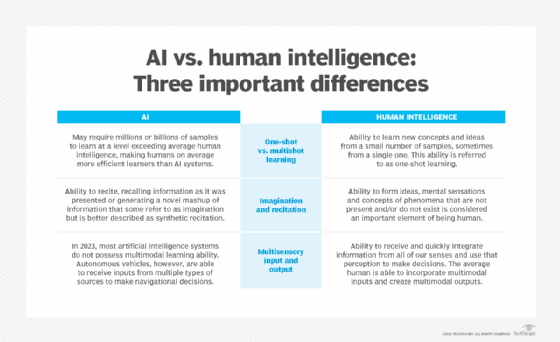What is an AI prompt engineer?
An artificial intelligence (AI) prompt engineer is an expert in creating text-based prompts or cues that can be interpreted and understood by large language models and generative AI tools. In contrast to traditional computer engineers who write code, prompt engineers use written language to evaluate AI systems for idiosyncrasies.
These professionals are also tasked with training and fine-tuning emerging AI tools, such as OpenAI's ChatGPT, Google's Bard, Dall-E, Midjourney and Stable Diffusion to deliver precise and relevant responses to people's questions.
The questions posed by users to AI models are known as prompts.
What does an AI prompt engineer do?
AI prompt engineers serve as intermediaries between machine learning (ML) models and the humans who query them. The job of an AI prompt engineer is to develop a set of inputs and train the models to produce the best and desired outputs back to the user. As such, the role involves writing text-based prompts and feeding them into the back end of AI tools to enable them to perform tasks, such as writing an essay, generating a blog post or creating a sales email with the proper tone and information.
Because AI systems lack intuition, they're dependent on human input to understand human language and questions to produce effective prompts.

The main elements of AI prompts
Well-crafted prompts play a pivotal role in enabling the AI model to grasp the user's intention and context, ultimately resulting in responses that are both accurate and pertinent.
This article is part of
What is GenAI? Generative AI explained
An AI prompt is typically composed of the following four elements:
1. Instruction. This is a simple question with a set of instructions on how the AI model should answer the question.
Example: Provide me with some easy low-carb recipes that take less than 15 minutes to prep and also make a list of ingredients needed to make them.
This prompt gives precise instructions on the type of recipes needed, the time required for preparation and the ingredients required to cook them.

2. Context. Context provides the AI model with essential background information, enabling it to produce relevant content. Without adequate context, responses can become generic or irrelevant.
Example: What are some green technologies that are used in transportation?
This prompt uses the context of "used in transportation" while posing the question regarding green technologies, which helps the model focus on answers that are specifically connected to vehicle-related green technologies.
3. Input data. This includes adding some input along with an instruction.
Example: Create a short biography of Albert Einstein (14 March 1879-18 April 1955), a famous physicist and scientist who created the theory of relativity, which establishes that nothing can travel faster than the speed of light. He won the Nobel Prize in physics in 1921 for his discovery of the photoelectric effect.
This prompt provides the AI model with some relevant information about Einstein and then instructs it to create a short biography of him.
4. Examples. Examples can also be fed into an AI model to receive a specific output about the examples provided.
Example: Create a music playlist based on the following songs: 'Bohemian Rhapsody' by Queen, 'Hotel California' by Eagles and 'Hey Jude' by The Beatles. The playlist should have a classic rock vibe and include similar iconic songs that evoke a sense of nostalgia and timeless appeal. Please provide at least 10 songs for the playlist.
This prompt guides the AI model to generate a playlist that aligns with the provided song examples and captures the desired classic rock feel.
For more information on generative AI-related terms, read the following articles:
Skills and requirements for AI prompt engineers
To successfully build and optimize prompts for AI learning models, an AI prompt engineer should have a combination of technical, linguistic and analytical skills.
Key skills required to become an AI prompt engineer include the following:
- Understanding of AI, ML and NLP. To work with AI systems, an AI prompt engineer must be familiar with machine learning concepts, algorithms and model structures. Making effective prompts also requires a mastery of natural language processing (NLP) principles, syntax, semantics and language structure.
- Programming skills. The primary programming language for NLP and AI tasks is Python. Therefore, a fundamental knowledge of Python and other programming languages is useful for tasks involving script development, model integration and data manipulation.
- Communication skills. Because AI prompt engineers frequently engage and collaborate with other teams and communicate with AI systems, they must have strong written and verbal communication skills to effectively work with stakeholders, explain critical requirements and comprehend project goals.
- Educational background. Although a background in AI or IT-related fields isn't always required, having a degree in computer science, data science or a related discipline can help. Since this profession focuses on the linguistic and cognitive aspects of AI, prompt engineers can come from diverse backgrounds, such as communications and cognitive psychology. Moreover, they can enhance their knowledge and stay current with the latest AI trends and developments by using online tutorials and self-study resources, including NLP frameworks and libraries, such as Natural Language Toolkit, SpaCy and transformers.
- Experience experimenting with pre-trained ChatGPT models. Those aspiring to enter the field of prompt engineering should consider experimenting and testing with pre-trained AI chatbot models, such as GPT-3 or GPT-4. They can conduct experiments with various prompts to observe the text generation capabilities and constraints of the models, thereby gaining a deeper understanding of ChatGPT's behavior and optimizing prompts through hands-on practice.
What is the salary range for AI prompt engineers?
Recognized by the World Economic Forum as one of the top jobs of the future, a career in AI prompt engineering can be fruitful.
The salary range for AI prompt engineers can vary significantly. Various sources mention salaries ranging from $175,000 to over $300,000. However, these figures are based on specific job listings and might not represent the entire range of salaries in the field.
Additionally, salaries can vary based on factors such as geographical location, experience and the organization or industry hiring for the role.
Prompt engineering and fine-tuning are both methods for maximizing AI output. Differentiate between these two approaches and explore the unique model training requirements associated with each method.





